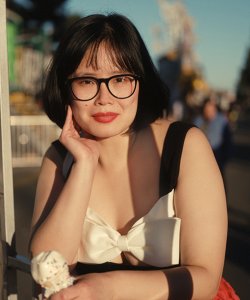Lunch Poems With Brandon Shimoda
In this recent installment of UC Berkeley’s Lunch Poems series, Brandon Shimoda reads a selection of poems and essays with the theme of “oranges,” which address the memory of Japanese American incarceration and war.
Jump to navigation Skip to content
In this recent installment of UC Berkeley’s Lunch Poems series, Brandon Shimoda reads a selection of poems and essays with the theme of “oranges,” which address the memory of Japanese American incarceration and war.

“I consider notetaking to be an integral form of the writing process.” —Dorothy Chan, author of Return of the Chinese Femme
“This year I turned my back to the world. I let language face // the front. The parting felt like a death.” In this About the Authors TV video, Victoria Chang speaks about her award-winning collection, Obit (Copper Canyon Press, 2020), and reads a poem from her new collection, With My Back to the World (Farrar, Straus and Giroux, 2024), which engages with the paintings and writings of Agnes Martin.
In the anthology Another Room to Live In: 15 Contemporary Arab Poets (Litmus Press, 2024) edited by Omar Berrada and Sarah Riggs, multinational and multilingual poet-translators challenge foundational narratives and rework mythologies through poetic expression. Yasmine Seale’s poem “Conventional Wisdom (Arabic Saying Translated Twenty Ways)” is composed of translations of an ancient aphorism expressing the inextricable place of poetry within Arab cultural heritage. Each line presents a variation on the truism: “Poetry is the record of the Arabs / The art of poetry is Arabs, collected / Good poetry is a list of Arabs / To speak in verse is to remain in Arab memory / To surpass another poet is the Arab odyssey.” Write a poem inspired by this idea of translating a proverb or maxim—either from another language or from English into English. How might you creatively interpolate different “translations” of the saying by incorporating connotations and riffing on free associations and personal experiences?
“When I sit down, I invite that muse, that ardor, that passion to get to some place of discovery.” In this preview for the season four premiere of the public television series Poetry in America, poets Richard Blanco and Amanda Gorman, among other writers and scholars, join host Elisa New to discuss two poems by pioneering Black poet Phillis Wheatley. Watch the full episode here.
In this inaugural Mary Oliver Memorial Event, U.S. Poet Laureate Ada Limón introduces her signature project which includes site-specific poetry installations in seven national parks and the anthology You Are Here: Poetry in the Natural World, published by Milkweed Editions in association with the Library of Congress. Limón is joined by poets Molly McCully Brown, Jake Skeets, Analicia Sotelo, and Paul Tran for a reading and conversation.
In this Politics and Prose event, Dylan Thomas Prize–winning author Nam Le reads from his debut poetry collection, 36 Ways of Writing a Vietnamese Poem (Knopf, 2024), and discusses the choice to write poetry rather than prose, and the sometimes questionable authority of writing about trauma in a conversation with Natasha Sajé.

“I don’t hold myself to a rigid writing schedule but instead listen to my mind, body, and heart and write accordingly.” —Alison C. Rollins, author of Black Bell
In Sharon Olds’s poem “May 1968,” the speaker recounts the memory of spending the night with other protesting students, who lay down their bodies on a New York City street at a university’s campus gates in order to obstruct the mounted police force that had been called in. While “spine-down on the cobbles,” she observes the city and surrounding scenery—the soaring buildings and the police and horses’ bodies—as she gazes upward, thinking about the state of her pregnant body. Write a poem this week from the vantage point of lying face-up, “from dirt level.” What circumstances bring you into this position? How does this upward point of view transform what you see, and how you feel about your own body?
“The age of portrait is drugged. Beauty / is symmetry so rare it’s a mystery.” In this 2018 event, Fady Joudah reads a selection of poems from his collection Footnotes in the Order of Disappearance (Milkweed Editions, 2018) for the Lunch Poems reading series at UC Berkeley. Joudah is the recipient of the 2024 Jackson Poetry Prize.